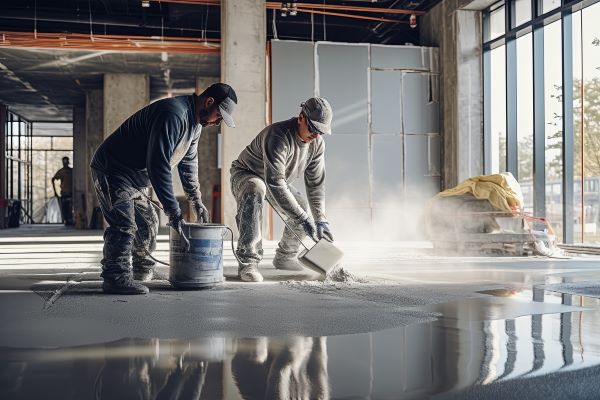Specialty chemicals, also known as effect or performance chemicals, play a crucial role in modern construction. From towering skyscrapers to intricate bridges, their role extends far beyond the concrete, wood, and steel materials they fortify.
Performance chemicals carry distinct formulations designed to impart specific characteristics or functionalities to construction materials, hence the name. They enhance organic or manufactured surfaces’ performance, durability, and overall quality, allowing for safer, more sustainable, and more efficient structures.
Let’s drill into the pivotal role of specialty chemicals, the unsung heroes shaping the foundations of contemporary construction.
Types and Examples of Specialty Chemicals in Construction
Special construction chemical products cover diverse substances formulated to meet the sector’s unique needs. They possess specialized properties, serving purposes beyond the primary composition of materials.
Here are some of the types of specialty chemicals used in modern construction:
- Admixtures and Additives: Enhancing Concrete Properties
Admixtures and additives are among the most commonly used specialty chemicals in construction. Retarding, accelerating, and air-entraining agents, as well as superplasticizers are key examples.
Retarding agents delay the setting of concrete, which is crucial for large-scale projects. Meanwhile, superplasticizers increase workability without sacrificing strength. Compounds under this category help minimize construction costs without compromising quality and safety.
- Waterproofing Agents: Protecting Structures from Moisture Damage
Waterproofing agents safeguard structures against moisture formation and water entry, a significant cause of structural deterioration. These chemicals create a barrier, preventing water penetration into building materials like concrete, masonry, and wood. Hydrophobic coatings, membranes, and sealants are commonly used waterproofing solutions, ensuring longevity and minimizing maintenance costs.
- Corrosion Inhibitors: Preserving Reinforced Concrete
Reinforced concrete structures face the threat of corrosion, primarily due to exposure to environmental elements and chemicals. Corrosion inhibitors, such as organic and inorganic compounds, are incorporated into concrete to protect embedded steel reinforcement. These form a protective layer, curbing the damaging impacts of moisture and chemicals and extending the lifespan of structures.
- Surface Treatments and Coatings: Enhancing Aesthetic and Protective Qualities
Specialty chemicals include surface treatments and coatings designed to enhance aesthetics while offering protective properties. Anti-graffiti, anti-carbonation, and UV-resistant coatings serve multiple purposes, protecting surfaces from damage caused by certain chemical reactions and harsh weather conditions. They contribute to the longevity and appearance of buildings.
- Specialty Adhesives: Building Stronger Bonds
Adhesives are substances that join materials together. They create a strong bond between similar or different materials by adhering to the surface irregularities on a microscopic level. Adhesives can provide structural strength, weather resistance, flexibility, and durability, depending on their composition and intended use.
The Significance of Specialty Chemicals in Construction
Specialty chemicals are the backbone of modern construction, revolutionizing the industry by addressing critical challenges and enhancing the performance of building materials. Their multifaceted roles help improve durability, increase sustainability, and ensure structural integrity.
- Enhancing Durability and Performance
Using admixtures and additives, the properties of concrete are modified to withstand harsh environmental conditions, temperature fluctuations, and heavy loads. These modifications enhance concrete structures’ strength, workability, and longevity, reducing the need for frequent repairs and maintenance.
- Improving Safety and Structural Integrity
Performance chemicals ensure an infrastructure’s safety and structural integrity in many ways. For instance, corrosion inhibitors used in reinforced concrete structures prevent the degradation of steel reinforcement, preserving the structural stability and safety of modern buildings, bridges, and roads. Moreover, surface treatments and coatings protect surfaces from environmental damage and contribute to maintaining a safe and aesthetically pleasing environment for occupants.
- Facilitating Innovative Construction Techniques
Self-levelling compounds, for instance, utilize specialized formulations to create smooth surfaces, simplifying the installation of floor coverings. Applying high-performance adhesives and sealants containing specific chemical compositions enables efficient and durable bonding of various construction materials, promoting novel and creative architectural designs.
Meanwhile, advanced technologies, such as self-healing concrete that utilizes encapsulated bacteria to repair cracks autonomously, indicate the strong potential of specialty chemicals in enhancing construction materials.
- Fostering Energy Efficiency and Insulation
Foam insulation and thermal coatings rely on specialty chemicals to regulate temperature, reducing heat transfer and energy consumption. They aid in maintaining comfortable indoor temperatures, thus decreasing the reliance on heating and cooling systems. Consequently, they play a vital role in creating environmentally friendly and energy-efficient modern buildings.
- Ensuring Sustainability and Environmental Responsibility
Incorporating specialty chemicals aligns with the growing emphasis on sustainable construction practices. Waterproofing agents, for example, prevent moisture-related damages, reducing the need for excessive material replacement and minimizing environmental impact. Additionally, other specialty chemicals extend the life of structures, reducing the overall carbon footprint associated with frequent reconstructions.
Conclusion
Specialty chemicals are indispensable in modern construction, elevating a building’s structural quality, sustainability, and safety. Their role in fortifying materials against degradation, enhancing structural resilience, and fostering environmentally conscious practices demonstrates their significance.
As the construction industry continues to advance, developing and applying innovative specialty chemicals will continue to shape and redefine construction practices.
Also Read
Integrating thermoformed plastics In Structural building components
Using Recycled Tires for Building Construction Research at Idaho State University Shows Promise

